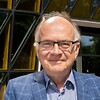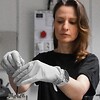Fritextsökning
Artiklar per år
Innehållstyper
-

Editorial: ”AI that both impresses and frightens”
”In the past, I've rarely been particularly impressed by something that was produced by AI. But this is something completely different”, Samuel Lagercrantz writes in an editorial.
-

Hello Jenni Nordborg!
Life Science Sweden would like to know more about Jenni Nordborg and asks her about her new job, why she became a chemical engineer and who her role model is.
-

Column: ”Authentic leadership and clear mandates pave the way for more female CEOs”
”I believe that the aspect of having clear mandates and titles on the one hand and women progressing into top positions must be explored further”, Helena Strigård writes in a column.
-

Individual DNA passport could result in fewer drug side effects
You may be required to show a DNA passport when you pick up medicines at the pharmacy in the future. According to a new study, patients might suffer 30% fewer side effects if the drug treatment is adapted to their genes.
-

Column: ”We need to exploit the benefits of the regulations“
You don’t need to search long on the Internet to find lists of the most innovative countries with Sweden ranking at the top. Sweden generally offers good conditions for growing new solutions, but it is also becoming increasingly clear that we are challenged in one area – regulations, writes Björn Arvidsson in a column.
-

The new Astra Zeneca CEO: “An incredibly exciting phase”
Almost 27 years have passed since Per Alfredsson from Södertälje stepped into Astra Zeneca as a newly hired engineer. After countless different roles, including heading the production of the company’s Covid vaccine, he is now advancing to the absolute top.
-

ALS – When the body has given up, but the brain persists
The nerve disease ALS gradually deprives the patient of control over the muscles and, eventually, also of speech. The eyes continue to function, though, and with the help of, among other things, a Swedish-developed invention, communication with the outside world can continue. “It’s their window to the world,” says ALS researcher Caroline Ingre.
-

Great Swedish innovations: Eye treatment became a feather in Pharmacia’s cap
From complicated and sometimes risky surgery to a routine procedure. Pharmacia’s injectable Healon revolutionised the field of eye surgery - and is considered by us one of the most important contemporary Swedish innovations in the field of medicine.
-

Ny Sverigechef till Boehringer Ingelheim
Australiensaren Paul Dunesky har arbetat inom Boehringer Ingelheim sedan 2013 – nu blir han Sverigechef.
-

The stomach medication that became the biggest blockbuster of the 1990s
The omeprazole molecule was synthesised as early as 1979, but it took many years before the then Astra had an approved pharmaceutical. Once this happened, a tablet was available that was soon to help millions of people worldwide and break all sales records.
-

He is zooming in on topical preparations
According to Zelmic CEO David Sagna, topical products in drug development is a growing market, and to keep pace with the development, the company is awaiting approval for its new GMP facility.
-

“We aim to be a start-up company with an academic spirit”
Chronic pain and Alzheimer’s are two diseases that plague many people worldwide and seem impossible to cure. However, Huddinge-based company Alzecure is working on developing drugs for both conditions.
-

“We need to keep investing in research and innovation”
Jenni Nordborg has worked for just over four years to highlight life science in Sweden. Her mandate as national coordinator ends in December 2022. ““Life sciences has been a long-term priority of governments since many years and I have no doubt that the ambitions will be strong going forward”, says Jenni Nordborg.
-

Biosimilars bring price pressure, but are they sufficiently used?
When biosimilars were introduced just over 16 years ago, hopes were raised that they would give many more patients access to effective but otherwise extremely expensive treatments with biological drugs. So, how well has Swedish healthcare used biosimilars? The answer partly depends on whom you ask.
-

Bought a tablet factory – and built his own empire
In 1995, Thomas Eldered was CEO of one of Pharmacia’s factories in the Stockholm area when the Swedish pharmaceutical giant, after a takeover, decided to move its production abroad. 34-year-old Thomas was facing an imminent risk of losing his job. However, instead, it actually turned out to be the starting point for one of the biggest success stories in Swedish life science.
-

Anders Blanck about his 17 years at Lif: “The industry is enjoying greater public trust now"
The announcement came as a surprise to those around him, but according to the protagonist himself, the timing was excellent. Anders Blanck is now leaving Lif – a decision that has been growing for some time. “I have been pretty much married to my mission
-

Anna Törner: Kalashnikovs in a new guise
Thanks to resisting European regulatory authorities, Europe has been spared the opioid epidemic. In the 1960s, the situation was the opposite as the American pharmaceutical authority, the Food and Drug Administration (FDA), refused to approve thalidomide (Neurosedyn), writes Anna Törner in a column.
-

Lucy Robertshaw: Did you know Stockholm wants to be in top 5 in the world for Life Sciences?
Karolinska Institutet Solna Campus has certainly become the next “Kendall Square”, writes Lucy Robertshaw in a column.
-

Amorphous materials take centre stage when Orexo develops new formulations
Swift resolution but with maintained stability. Orexo’s new drug delivery platform tackles the problem of amorphous materials. “Our technology has the positive properties of the material, and it also cracks some of the problems,” says the company’s Research and Development Manager Robert Rönn.
-

Study: Our behaviour may have been guided by wishful thinking during the pandemic
A new study suggests that we systematically underestimate health risks if and when it suits us. This was especially true during the pandemic, as our risk assessments may have been guided by wishful thinking rather than a rational perception of the risks.
-

Björn Arvidsson: “We need robust and recognized ecosystems for continued competitiveness”
“We have idea carriers and excellent innovation opportunities, and now we must invest in creating ecosystems that provide them with even better growth opportunities,” Björn Arvidsson writes in a column.
-

Göran Stiernstedt: “We are the world’s worst at continuity”
Failed investments in primary care, an unreasonable system with online doctors and a public failure at coordinating the healthcare IT system. Göran Stiernstedt does not mind his language when describing the shortcomings of today’s healthcare system. “It makes me extremely frustrated,” he says.
-

Ny metod för mikroskopi öppnar genväg till nya läkemedel
Forskare vid Chalmers har utvecklat en helt ny mikroskopiteknik för att kunna studera de minsta biologiska partiklarna i sitt naturliga tillstånd – och därmed öppna vägar för snabbare utveckling av nya läkemedel och vaccin.
-

Anna Törner: To kill your darlings
Hopes were high when Anna Törner and her colleague started a study on a dietary supplement that seemed unbelievably good. “Enthusiastically, we dreamed of exciting results and perhaps a publication in a high-impact journal,” she writes in a column.